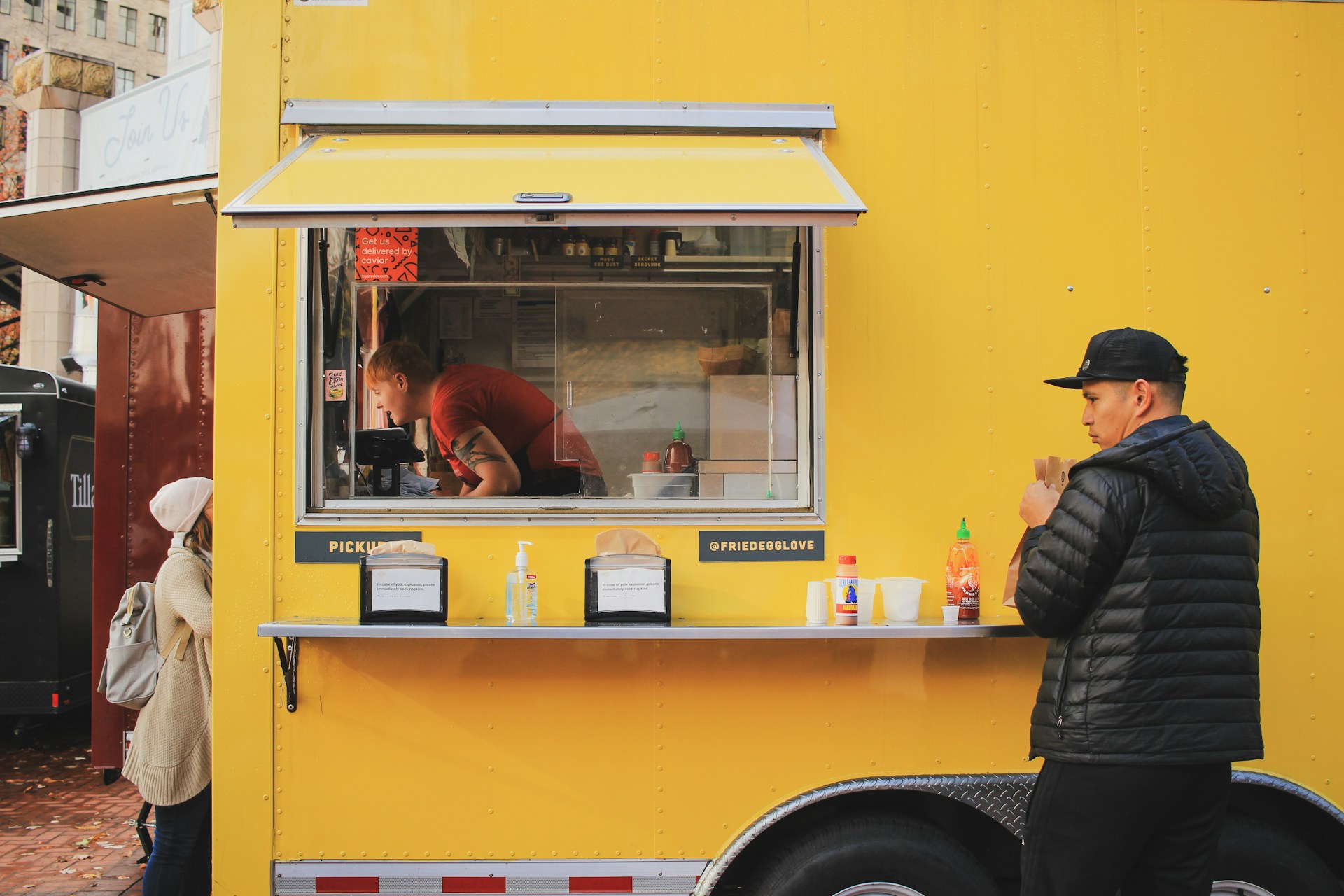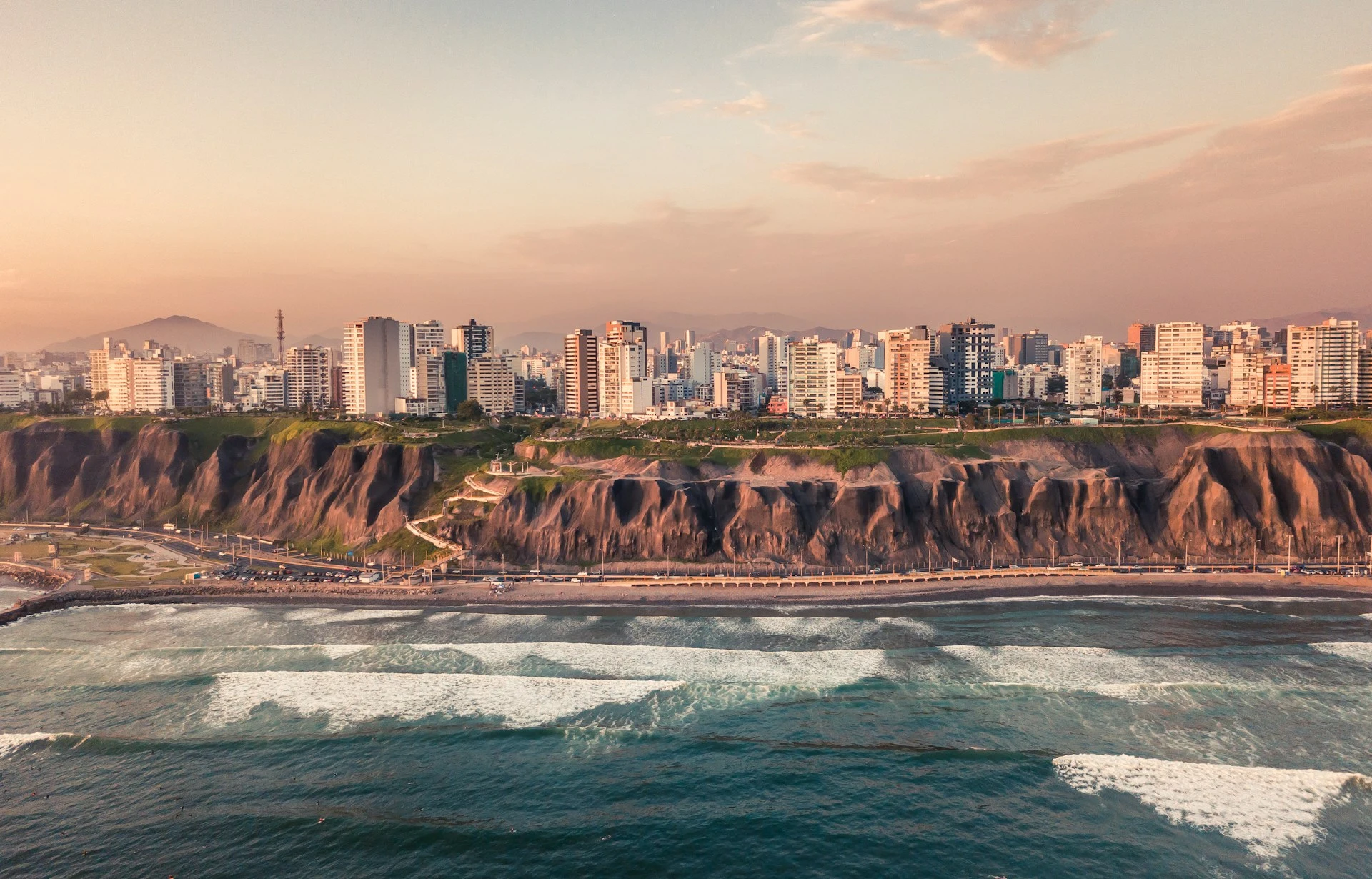Street food and food trucks around the world each have their own purposes. For street food, it’s a way for you to experience the culinary culture of a place while you’re in it.
As for food trucks, they transport those same culinary cultures to places abroad to share with others. Either way, you are sure to taste something out of your world when you visit food trucks or get street food.
But how are we supposed to find these elusive meals on wheels, you might be asking yourself. Well, that’s how the ALLMYNE app helps you out.
With the app’s AI-Recommender feature, you are able to add attractions—including food trucks around the world—to your itinerary. With an ALLMYNE local guide at your disposal, you are sure to have a fruitful hunt for the street food you’re craving. Download the app on your tablet, laptop, or smartphone at the Apple Store or Google Play Store today!
It’s no surprise that both street food and food trucks have been around for ages. Street food dates back over 10,000 years.
It was supposedly an Egyptian custom documented by the Greeks, who then adopted the practice from the port of Alexandria. The original thing sold was fried fish! From Greece, it made its way to Rome. In the excavations of Pompei, there were remains of thermopolia, which are a type of snack bar for drinks and hot food.
Poor people ate from street food vendors because they didn’t have kitchens and thermopolia had affordable food.
As for food trucks around the world, it was actually America that started the trend. Taking inspiration from Roman thermopolia, chuckwagon were created in the American wilderness in the 1860s.
These were covered wagons with perishables for cowboys, loggers, and the Ingalls family. Some chuckwagons were also mobile barbershops or dentistry venues. Around 1890, food trucks started catering to university students.
Sausages were sold outside of college dorms at places like Yale, Princeton, and Harvard. In 1936, America had its first recognizable food truck: the Weinermobile of Oscar Meyer. In the late 2000s due to the great recession, food trucks saw a surge because chefs were being laid off and food trucks were cheap to buy.
If you are someone who was inspired by Jon Favreau’s performance in Chef, then you’ve definitely thought about all the cool food trucks around the world. Read on to see ones you have to check out and how ALLMYNE can help you visit them!
Food Trucks Around the World: Stoplights, and We Mean Spotlights
The first food truck to see out of our top ten is Mother Clucker in London. The food truck is actually converted from an old US Army ambulance!
They make fried chicken that is brined with sweet tea, soaked in buttermilk, and battered twice over. They also have sides like Cajun fries, cornbread, and biscuits.
Next up is Harry’s Café De Wheels in Australia. This one has a fun backstory. Harry’s Café De Wheels, originally just “Harry’s,” was started in 1936 by Harry Edwards. Hungry in the late evening, he realized that there wasn’t any late-night spot for foodies. So, he opened a caravan café near a naval dockyard.
There, he served late night crumbed sausages to sailors and soldiers. In 1945, Sydney made a rule that food caravans had to move a minimum of 12 inches a day, so he added “Café De Wheels” to the name. They serve a variety of mince pies, sausage rolls, and hot dogs. Fun fact: Colonel Sanders visited it in 1974, and Elton John held a press conference inside during the 70s!
Bangkok’s first seafood truck is third on our list. Summer Streets sells barbecued seafood baskets out of a vintage Citreon truck.
The baskets range from roughly $12 USD to $30 USD, but you definitely get your money’s worth for how much food they give you! It is usually located in The Camp Vintage Flea Market near Chatuchak and also serves great craft beer, giant prawns, and squids.
Similarly to Harry’s, The Prince of Venice in LA has an intriguing backstory. This food truck was created by a real prince named Prince Emanuele Filiberto di Savoia.
He is the grandon of the last reigning king of Italy, King Umberto II, and the great grandson of Queen Margherita. You may recognize Queen Margherita of Savoy as the one who a local pizza maker named the deliciously famous pizza after!
“After discovering the L.A. food trucks,” Prince Savoia says, “I saw a need for high-quality Italian food [made] with fresh handmade pasta and sauce.” The food truck uses Italian flour, olive oils, and truffles but all of the other ingredients are locally sourced from Southern California. The pizza menu changes based on local ingredient availability.
Halfway on our food truck list is the Fire & Ice Cream Truck that travels around Missouri. They sell ice cream out a vintage 1946 Ford fire truck! The truck is one of firsts.
It was the first motorized fire truck in Albion Illinois and then became the first food truck in St. Louis. You can find them at locations like 9 Mile Garden, ower Grove Park on Food Truck Fridays, near Saint Louis Art Museum for the Art Hill Film Series, and the Alton Amphitheater Food Truck Festival.
Rolling in at number six—pun intended—is The Lobster Roller of Massachusetts. You can find their truck stop locations at the bottom of this page where they regularly update it based on local events.
The owner was a former TV news and sports reporter who opened the food truck in 2021. The truck gives out fresh New England lobster rolls, homemade clam chowder, and lobster grilled cheese on Texas toast. Just the thought of those three things makes my mouth water!
This next stop is proof that food trucks around the world aren’t only for humans. Woofbowl in New York is a food truck for—you guessed it—dogs. The food truck is BIPOC and veteran-owned.
A couple, Ron and Solo, make fresh dog food entirely from scratch. Ron, who came back from the military with PTSD, led the charge for the couple to get two French Bulldogs as emotional assistants.
Solo noticed that the dogs had a positive change following a diet switch, so she decided to dedicate her life alongside her partner to share nutritious meals with dogs all over New York City. Man’s best friend has their pick of the litter—pun intended, again—with Woofbowl offering burgers, nuggets, seasonal meals like pho in the winter, a Woofbrew dog beer, and crepes.
From the mind of a Belgian chef named Jean Baptiste, Keep on Toasting is the first gourmet food truck in Brussels. He sells croques, hot sandwiches with ham and cheese, and only four are on the menu:
- Spring Croque—has leeks and radicchio salad
- Indian Croque—has tandoori cream cheese and carrots
- French Croque—has brie and crispy onions
- Veggies Croque—has courgettes and cashews
The second to last food truck around the world is Mr. Bannock in Canada. What is a bannock exactly? The dish was brought to Indigenous peoples’ diets by Scottish fur traders. It is a type of fried bread. Mr. Bannock is Vancouver’s first indigenous food truck. It was opened by Squamish Nation chef Paul Natrall who gets his ingredients from the Squamish Nation along with their traditional methods of cooking like clay and stone baking. Fun fact: his truck art was done by KC Hall, a member of the Heiltsuk Nation! Mr. Bannock has calzone and waffle versions of bannocks.
Our final food truck you should track down is Black Spoon in Paris. The first African food truck in Paris, it offers fried banana plantains, accras, sweet potato fries, thiakri degue, tuna passelles, mafé au beef, and other traditional African foods.
Franco-Sengalese Fati Niang opened the truck in 2013 and is committed to sustainability and being eco-friendly. They use biodegradable packaging, products from natural agriculture, and local sources for products.
After all that, you might be wondering how you’re supposed to track down these elusive food truck around the world. Now, while that is part of the fun, ALLMYNE can help lead you in the right direction.
You can use the AI Recommender to find food spots near where you’ll be and even add them directly to your itinerary. The AI Recommender can also offer you options based on your preferences for hotels, parks to visit, supermarkets, and so much more!
Another way is to search for the place in the “Search for a location” box on your trip’s page.
For example, if you are planning a trip to Berlin, look up “Die Dollen Knollen,” a famous food truck there, to add to your travel plans! We will dive further into ALLMYNE’s app features later on, but first let’s get back to some delicious descriptions of delicacies. We’ve organized these famous street foods by regions of the world, so feel free to jump from section to section!
Africa
In South Africa, popular street food includes malva pudding and bunny chow. Malva pudding is a caramelized, baked sweet pudding with a spongy interior soaked in a warm butter sauce.
Bunny chow, considered a sandwich, is spices, meat (usually lamb or chicken), chickpeas, and potatoes all together in a bread bowl.
The second place in the African region is Algeria. Algeria’s garantita, which has a variety of different spellings, is made in every Algerian home. Sold hot by vendors inside bread and topped with harrisa, mayo, and onions, garantita is a chickpea batter with beaten eggs on top that is then baked. It can also be sold in square slices.
Americas
Off to the Americas, our first stop is Peru. If you’re a long time fan of ALLMYNE, then you know that one of our guides is Aaron, a Peruvian who has shared his culinary expertise with us from time to time—hey, Aaron! In Peru, ceviche is a big deal.
It is considered a healthy dish because it’s raw, fresh fish or shrimp that’s been marinated in lemon and/or lime citrus juices. Other ingredients commonly added are onions, cilantro, peppers, and tomatoes.
Further north is El Salvador where they like to sell pupusas in the streets. Believed to originate from the Indigenous Pipil tribe, El Salvadorans brought pupusas all over the world during the 1980s civil war. Prior to colonization, pupusas were vegetarian. After colonization, pupusas started to have meat fillings because meat became accessible.
It’s no surprise that Mexico is on this list. There are countless street foods to pick from when it comes to Mexico: tacos, quesadillas, gorditas, molote, empanadas, and so on. Our spotlight for Mexico is esquites. This is Mexican street corn salad.
The first time I ever saw elote, Mexican street corn, it was on Nacho Libre. When I eventually managed to try some, it was a divinely delicious experience. With esquites, they take the basics of elote and add a garlic, mayo, cheese, lime, and chile sauce to create a colorful salad.
The fourth street food to try is cochinita pibil in Yucatán. The word “pibil” is for dishes cooked in a pib, or an earthen oven that’s just a hole in the ground. Cochinitat pibil is a whole roasted pig with achiote rub. Achiote is a bright red seed from a small shrub. The pig can also be marinated in an achiote paste along with orange and lime juices.
The final food to hunt down in the Americas is in Buenos Aires. Choripán resembles a hot dog. It’s a french baguette covered with chimichurri sauce before adding a chorizo sausage. Street food vendors then butterfly the entire sandwich to give it an even and extra char.
Europe
Journeying across the ocean to Europe, we are starting in Portugal. Pasteis de nata, or Pastel de Nata, are Portuguese custard tarts. With a flaky crust and sweet custard inside, people can’t get enough of these sweet treats when they visit Portugal.
Similarly in Spain, churros are all the rage. Churros are fried pastry dough piped into hot oil with a piping bag that has a star tip on it. Once the churros are cooked, they are coated with cinnamon-sugar.
The Netherlands is home to poffertjes, which are described as “puff little dainty [pancakes]” by The Dutch Foodie. These miniature Dutch pancakes are yeasted and baked in special cast iron pans that have small-sized, shallow indents for exact pancake shapes every time. They are usually dolloped with some melting butter and a sprinkle of confectioners’ sugar.
The next street food has a bit of some controversy. When it comes to Baklava, people debate whether it came from Greece or Turkey.
You can decide for yourself based on articles like this one, this one, and this one. For brevity, we will say they’re Turkish. Baklava is a dessert of paper-thin layers of phyllo pastry dough with a sweet filling made of chopped nuts.
It usually has a coating of honey or syrup. Another Turkish delight—not the actual Turkish Delight—is simit bread. Also called the “Turkish Bagel,” these bread rings are coated with sesame seeds, creating a soft inside and crunchy outside.
Next up is the Russian blinchiki. Another take on pancakes, blinchiki is similar to crepes. Unlike crepes, blinchiki uses sugar, the dough is not cooled before baking, and yeast dough is used. Fillings can be sweet—like Nutella, berries, and/or sweetened cottage cheese—or savory—like minced meet, cheese, and/or mushrooms.
For Italy, we have two options, one of which you won’t be surprised to read about if you know me well. The first one, however, is arancini.
This is fried risotto that is extremely popular in Sicily. The risotto is rolled into a ball, stuffed, breaded, fried, and served with a side of marinara sauce. The second street food is obviously gelato. Italian for “ice cream,” there are key differences between what Americans know to be ice cream and what gelato actually is.
Gelato has lower milk-fat, is churned slower, and is served at a warmer temperature to get that softer and creamier outcome. If you’re interested in reading about the most delicious gelato I’ve ever had, check out my article on my trip to Spoleto here!
Another savory street food stop you have to make is in Greece. Kontosouvli is what we’d call a continuous dish. There’s really no start or end.
The outer layer of the meat, which is always pork butt, is cooked until slightly crisp and sliced off for eating. Then a new layer is exposed, cooked until crispy, etc. The meat is marinated prior to being cooked over a charcoal rotisserie.
Moving on over to Georgia, their khachapuri is to die for. This fluffy bread gets molded into different shapes before the center is filled with ingredients like cheese and eggs.
Similarly in Bosnia, burek is a phyllo pastry dough that can be filled with anything from meats and cheeses to spinach and apples. This bread can be formed into shapes like a horseshoe, coil, or round circle.
The last European stop is in Germany. Currywurst is sausage with a curry ketchup. There really isn’t a distinct recipe for curry ketchup, so there are many takes on it around the world. Fun fact: there was a museum in Germany completely dedicated to currywurst!
South-East Asia
Moving right along, the first stop in the South-East Asian region is India. There is pav bhaji and amritsari kulcha in India that has a lot of popularity in the world of street food, and it’s not hard to understand why.
Pav bhaji is a thick, spicy vegetable gravy served with a side of dinner rolls. It can also come with some crunchy onions and lemon wedges. As for amritsari kulcha, this food is a flatbread made with flour and potato stuffing.
It is baked in a traditional Indian tandoor oven and is a popular alternative to naan. It is different from other Indian breads, though, because it uses just plain flour. It can be served alongside yogurt dips, raita, or curries.
Indonesia racked up a lot of delicious street food spotlights! Our top favorites are:
- Siomay: Steamed mackerel dumplings, siomay is the Indonesian take on Chinese shumai dumplings. In China, they use ground pork and shrimp, but because of Indonesia’s large Muslim population, they replace the fillings with fish and veggies.
- Pempek ikan: These fried fish sticks originated in Palembang and are usually boiled then deep fried. They are served with a spicy tamarind sauce called saus cuko.
- Batagor: Popular in Bandung, these fried dumplings are stuffed either with fish or meat paste inside a tofu-wonton skin. They’re served with a heaping of peanut sauce, kecap manis (sweet soy sauce), and a spicy simbal sauce (chile relish).
- Bakso: Meatballs made from beef surimi, bakso has a similar texture to Chinese fish balls. They are dense and spongy and are the stars of the show in mie bakso, a noodle soup dish featuring the meatballs.
Western Pacific
Our final region is the Western Pacific region. To start, we are going to recall the halo-halo from the recent Philippines article (which you can find here!).
Halo halo, meaning “mix-mix” in Tagalog, is shaved ice layered with coconut, fruits, and tapioca pudding.
In China, bao buns are extremely famous. “Bao” actually means buns, so now we will be calling these “buns buns.” The name “Bao” may sound familiar to you from the lovable, emotional Pixar short, which shows how these steamed buns are made! They can have a sweet or savory filling.
For the Japanese, dango is the street food to look out for. Meaning “dumpling,” dango is a sweet rice ball. It comes in many different varieties like
- mitarashi (the most popular with a sweet soy sauce glaze)
- hanami (enjoyed during cherry blossom season with three different colors on one skewer)
- goma (rolled in sesame seeds and filled with red bean paste)
Our last two street foods are in Vietnam and Malaysia. For the Vietnamese, bánh mì is popular amongst street vendors.
This is a baguette with pork or chicken pate, mayo, pickled vegetables (usually carrots), green onion, chilies, Asian ham, and some cilantro.
In the same bread vein is roti canai in Malaysia. The dough for roti canai is rolled out so that it’s paper thin before it is folded or rolled to make multiple flaky layers. It is a popular breakfast and snack dish!
All the World’s a Plate, and We All Are Merely Eaters
So I just threw a lot of food from a lot of different places at you—food fight, anyone?—and you may be wondering how you’re supposed to keep track of all of these places. Sure we have the journal you can log all your adventures in and eventually turn into a printable scrapbook, but that’s not everyone’s style.
Well, ALLMYNE also has a built in geo-location tracker. When you’re in the country for a period of time, the app will automatically log that you’ve been there.
On top of this, it can be a fun game between you and your friends and family to see who can visit the most the fastest! Let us know in the comments below what places would be the top three you’d check off!
Download the ALLMYNE app from the APPLE STORE or GOOGLE PLAY to seamlessly plan, capture, and share your travel journey with a global community of fellow explorers.
Upgrade to our PRO subscriber level for even more perks, including audio recording in your journal, AI-powered location suggestions tailored to your interests, unlimited trip locations, and unlimited storage for all your travel memories. Download the ALLMYNE app now – the ultimate travel companion to enhance every step of your journey!














